Sanna Marin: The feminist PM leading a coalition of women
- Published
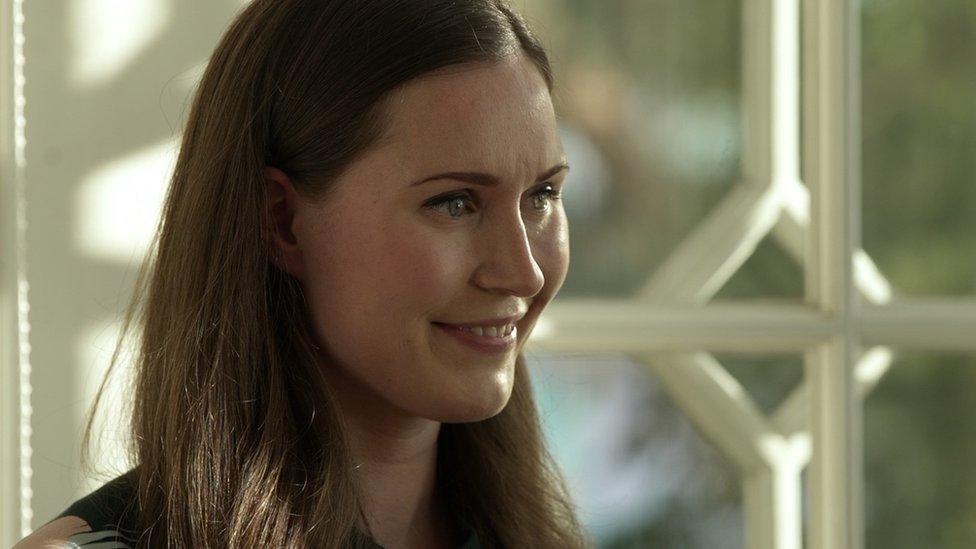
A year will soon have passed since Finland's new coalition government headed by five women started work. It has dealt efficiently with the coronavirus pandemic, while drafting an ambitious Equality Programme - a programme that states, among other things, that everyone has the right to determine their own gender identity.
It's a walk of less than 200m from the prime minister's office to the House of Estates, where Prime Minister Sanna Marin is about to chair a meeting on her government's signature Equality Programme.
She's not in the mood for small talk, but who would be on their first week back to work after a honeymoon? The short break at an undisclosed location in Finland followed a surprise August wedding, quickly arranged against the backdrop of a global pandemic, to the father of her toddler.
A photo of Sanna Marin, in her long-sleeved Finnish couture satin wedding dress, embracing husband Markus Raikkonen, a former professional footballer and her partner of 16 years, was an unexpected post on her active, and very personal, Instagram account. She'd previously shared a photo of herself breastfeeding her daughter Emma.
The couple stood with arms around each other, smiling broadly, in the picturesque grounds of Kesaranta, the official prime ministerial Helsinki residence, an ornate wooden villa on the banks of the Baltic Sea.
Allow Instagram content?
This article contains content provided by Instagram. We ask for your permission before anything is loaded, as they may be using cookies and other technologies. You may want to read Meta’s Instagram cookie policy, external and privacy policy, external before accepting. To view this content choose ‘accept and continue’.

It was rapidly shared by political editors and fashion bloggers, podcasters and high-school students - the second photo of Sanna Marin in less than a year to make an instant impact.
A dozen or so reporters are waiting on the steps of Finland's House of Estates, a Renaissance building where the coalition government meets behind closed doors.
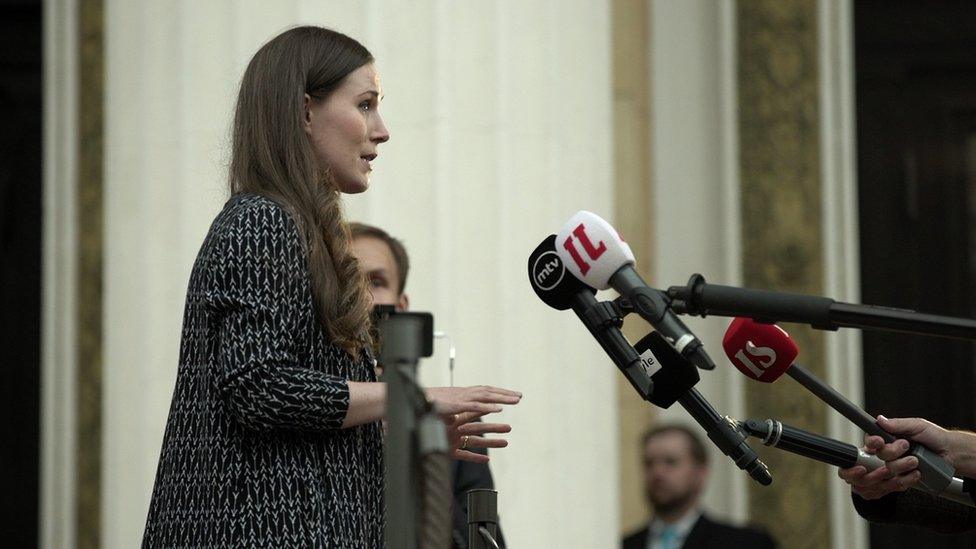
"I don't prepare what I say to them," Sanna Marin says as she approaches them, her female bodyguard walking behind. "They'll ask me anything and I'll answer honestly."
There'll be a lot more questions about her personal life this week perhaps?
"No. They want to know about the issues, we have a lot going on," she replies firmly. "Maybe they'll ask at the end."
Some of the reporters are wearing masks, a few are holding extendable boom mics. All snap to attention as she walks up the other side of the cordoned steps to face them.
She's the first politician to arrive at the meeting, and she's right - the Finnish media asks her about the issues.
And four hours later, after the meeting, she stops outside to talk to them again.
She is the last politician to leave.

The first photo of Sanna Marin that went viral was taken more than 200 days earlier, in December 2019, on the first day of her new job. As Finland's new and youngest-ever prime minister, the then 34-year-old Sanna Marin stood smiling broadly, next to the other politicians who would be leading her centre-left coalition government.
They were all women. At the time the photo was released, only one leader of the five-party coalition was over the age of 34.
Allow Instagram content?
This article contains content provided by Instagram. We ask for your permission before anything is loaded, as they may be using cookies and other technologies. You may want to read Meta’s Instagram cookie policy, external and privacy policy, external before accepting. To view this content choose ‘accept and continue’.

Standing at the podium with her cabinet, she told a sea of photographers that she represented a younger generation and that she welcomed the international media attention. It was an opportunity to show the world "who we Finns are".
The message reached those outside traditional political circles.
Guitarist Tom Morello of Rage Against the Machine posted a photo of the coalition on his Instagram page, outing Sanna Marin as a fan of his American rock band. She confirmed the sentiment in a millennial manner, by liking his post.
The headlines wrote themselves.
"Feminism comes of age in Finland"
"Finland's parliament: pioneer of gender equality"
"Women rule: what we've been waiting for"
There were sexist memes too, depicting the women making decisions while bathing together in a sauna.
In many ways the stage had already been set for such a coalition. If any country was going to be a Wonderwoman Island feminist utopia it was Finland.

BBC 100 Women

Watch the documentary Women Run the World: Finland's Female Leaders (readers in the UK)
Check BBC World News transmission times (readers outside the UK)

In 1906, it became the first country in the world to give both full voting and parliamentary rights to women, a feat which most other Western nations wouldn't achieve until after World War One.
The following year, 19 women were elected to parliament. And in 2000, Finland elected its first female president, Tarja Halonen. A female prime minister, Anneli Jaatteenmaki, followed in 2003.
By late 2019, and after one more female prime minister, Marin was chosen by her centre-left Social Democratic Party, to take over from Prime Minister Antti Rinne, following criticism of the way he had handled a postal strike.
The appointment made her the youngest ever leader of the country, and no-one could have predicted what awaited her.
Almost three months to the day, on 11 March, the World Health Organization declared the outbreak of Covid-19 to be a pandemic. But the Marin cabinet was ready when the virus arrived.
By 16 March, Finland had not just restricted movements but had triggered the Emergency Powers Act, last used in World War Two, which gave the government power to regulate wages and require "compulsory manpower placement to procure labour". This move was criticised in the media, but polls showed the public backed it.
One clear directive was given to the people of Finland: stay at home where possible. Every individual with mild symptoms was encouraged to get tested and regular online meetings were set between laboratories, doctors and clinics to co-ordinate plans.
Sanna Marin and her four top cabinet colleagues gave weekly coronavirus briefings, accepting questions from both citizens and the media. One was devoted to queries from children.
Allow Instagram content?
This article contains content provided by Instagram. We ask for your permission before anything is loaded, as they may be using cookies and other technologies. You may want to read Meta’s Instagram cookie policy, external and privacy policy, external before accepting. To view this content choose ‘accept and continue’.

She was praised and placed in the same bracket as the heads of Taiwan, Germany and New Zealand, leading some to ask whether female leaders were better at handling a crisis.
"There are countries led by men that have also done well," Sanna Marin tells the BBC. "So I don't think it's a gender-based issue. I think we should be more focused on what the countries that have done well have learned."
Finland, with a population of 5.5 million, has had just over 370 deaths, a rate of around 60 deaths per million population.
The UK death rate is more than 10 times that.
"I think a few of the things that we have learned in Finland is that it's important to listen to scientists to use all the knowledge that it is there, and to make bold decisions in uncertainty - I think that's also very important," says Sanna Marin.
"We have a society that is based on trust. People trust the government, they trust the democratic order."
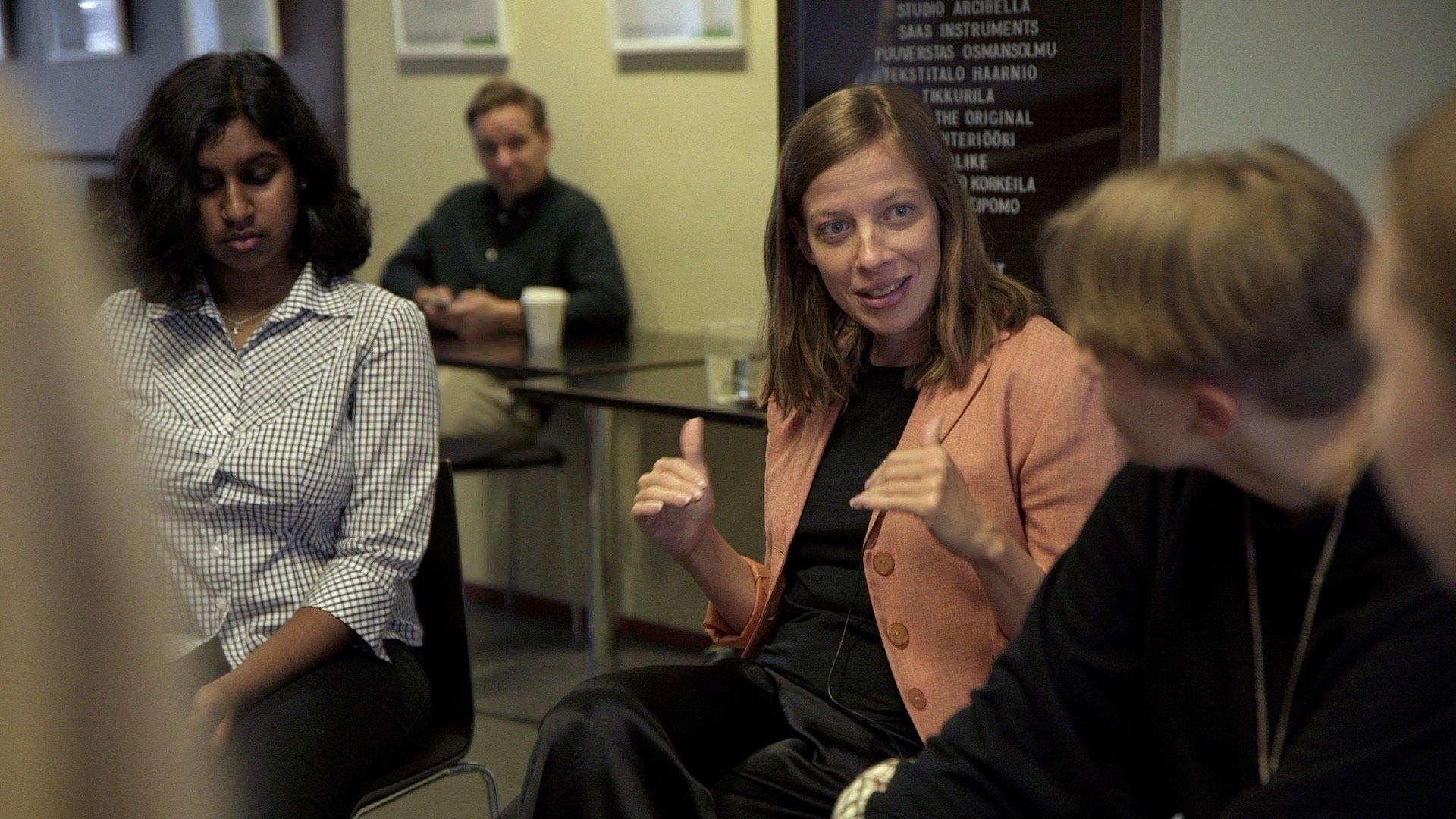
Minister of Education Li Andersson rejects the idea that women politicians always find it easier to agree
The coalition faced another shaky moment when deputy prime minister and Centre Party leader, Katri Kulmuni - at 33, the youngest of Sanna Marin's four coalition partners - resigned due to an expenses scandal. In September, she was replaced by another woman, Annika Saarikko.
Publicly the coalition appeared united, but there were private disagreements.
"No party can have it just their own way," says Minister of Education and leader of the Left Alliance, 33-year-old Li Andersson.
"Sometimes there are these kinds of tensions that have to do with making compromises behind closed doors. I think there is kind of this tendency of some people to say that because you are a woman, you will make a certain type of policy, or it's easier for you to agree when you're all women and so on. And that's not necessarily the case."

In her adolescence Marin couldn't have imagined a future where she was living in Kesaranta with her husband and their two-year-old daughter, Emma.
"Politicians and politics seemed very far away. An entirely different world to where I lived," she says.
"Like many other Finns, my family is full of sad stories," she wrote in her personal blog in 2016.
She was raised in a small town in the south-west of Finland called Pirkkala, by her mother, and her mother's girlfriend. A "rainbow family", she says, but under constant financial pressure. After her mother, who had grown up in an orphanage, divorced her alcoholic father, she survived on benefits. From a young age Sanna Marin worked, mainly in retail jobs.
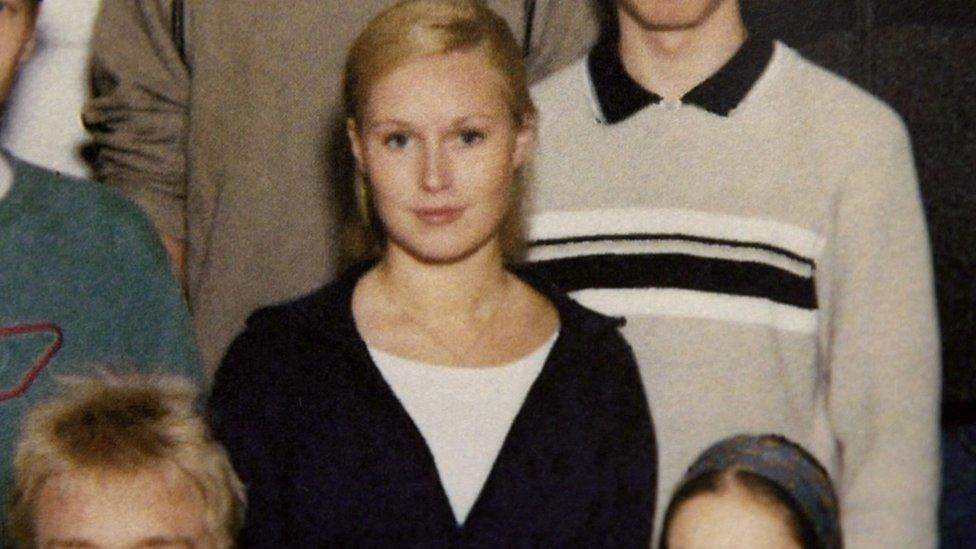
Sanna Marin was an "average student" says her high school teacher
There weren't early signs of potential. Her teacher, Pasi Kervinen, at Pirkkala High School, calls her "an average student", albeit one who asked for extra homework at the age of 15 in order to improve her grades.
Her political wake-up call, as she calls it, came in her 20s, when she started to think it was possible to improve not just her own circumstances, but those of others around her.
This is the motivation behind the Marin government's Equality Programme, which includes policies to encourage parents to share caring responsibilities equally, to crack down on domestic violence, close the gender pay gap and improve educational outcomes for children from poorer backgrounds and immigrant families.
There are also plans to reform the Trans Act, a law that currently requires those seeking legal gender recognition to undergo years of mental health screening and, unless they are already infertile, enforced sterilisation.
"Everyone should have the right to determine their own identities. And the programme supports this," Sanna Marin says.
Does she consider trans women, women?
"It's not my job to identify people," she says firmly. "It's everyone's job to identify themselves. It's not my place to say."
She may be the only government leader to have openly stated such a position on gender self-identification.
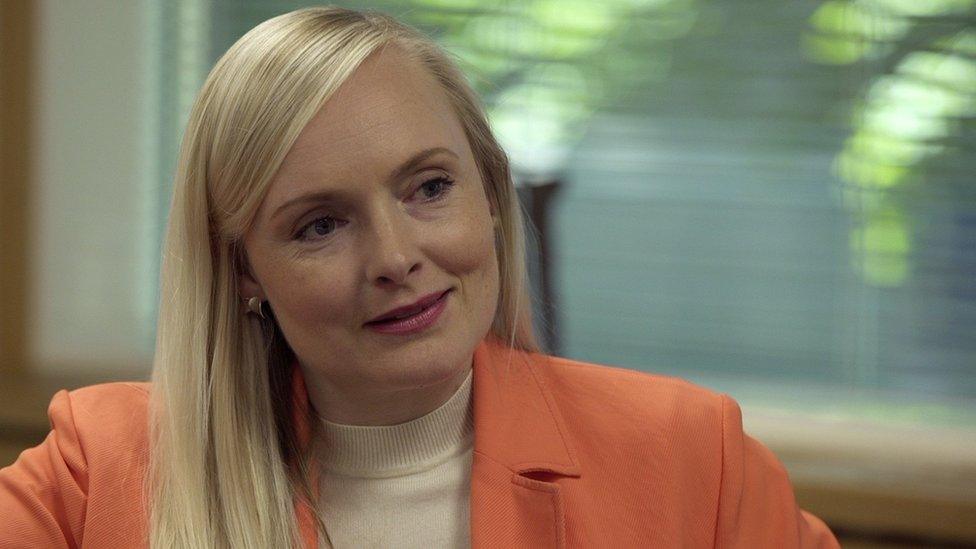
Coalition member Maria Ohisalo, of the Green League: Five educated white women are "not very representative"
Trans rights campaigners have been lobbying for years for reform of the "backward" Trans Act, and some say they still doubt that this government will achieve it.
All previous governments that have tried to change the law have had to back down under conservative pressure, says activist Kasper Kivisto, who has met the coalition to offer his advice.
"We have the youngest female leader of a country, but alone it's just a token," he says. "It has to have the support of the system behind it before it actually makes a difference."
But this time all five parties in the coalition are in favour of reform, and a bill is due to be put to parliament next year.
"Finland has had coalition governments forever. So, we are used to trying to make compromises and trying to find consensus between different parties and ideologies," says Sanna Marin. "I think this is a strength but it's not always the fastest way to get things done."

In April, Marin's handling of the pandemic helped her reach an approval rating of 85%, although she says she doesn't look at polls.
But there have been criticisms. During the global Black Lives Matter protests, some black Finns took to social media to point out that the Equality Plan, while it addresses various forms of inequality, fails to recognise that those suffering from it most tend to be people of colour.
A 2019 report from the Council of Europe said 63% of people of African descent experienced regular racist harassment in Finland - which is the highest rate in Europe.
And currently there is only one black female MP in Finland's parliament, Bella Forsgren.
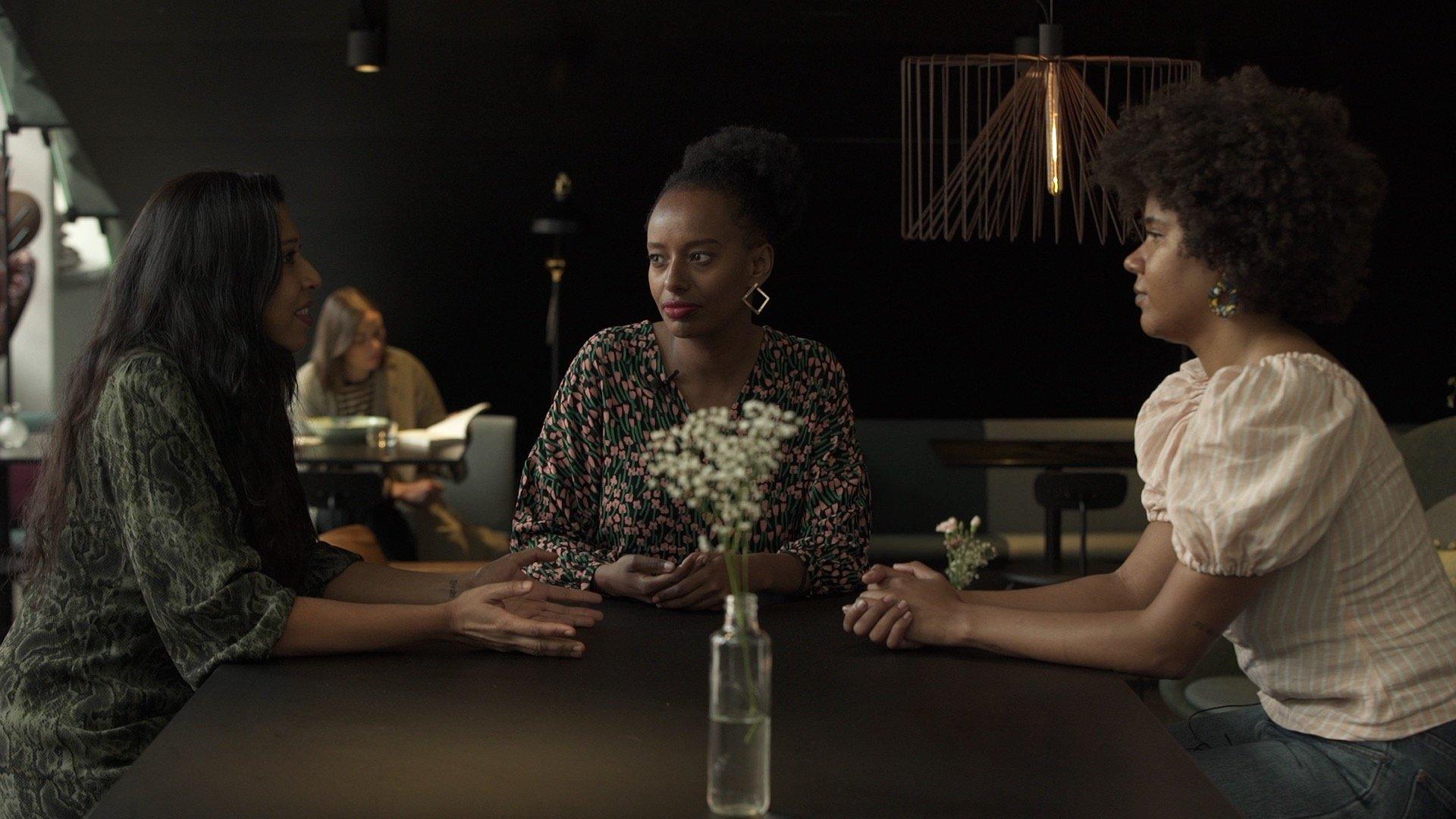
Bella Forsgren (centre) is Finland's only black female MP
Maria Ohisalo, the 35-year-old leader of Finland's Green League says she agrees with those who say that the government must do more to encourage diversity in public life.
"Five educated white females is not very representative in the end. If we really look at the equality here, it doesn't show yet," she says.
"Of course our backgrounds still affect the possibilities that we have in life and that shouldn't be the case," says Sanna Marin. But fixing this isn't just a job for her, it's one for all Finns, she says. And she insists the Equality Programme will help improve the position of racial minorities.
"We must all be focused on how we can make the programme a reality," she says. "So this is my mission as prime minister."
BBC 100 Women names 100 influential and inspirational women around the world every year, and tells their stories. Follow us on Instagram, external and Facebook , externaland join the conversation, using#BBC100Women.